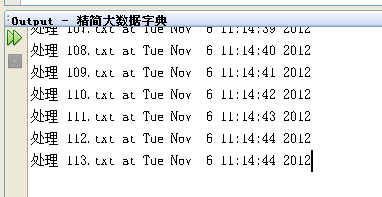小弟我在江北用pythonj脚本提取扫描IIS的字典关键词
日期:2014-05-16 浏览次数:21672 次
我在江北用pythonj脚本提取扫描IIS的字典关键词

我真的见识了什么叫压缩,22M文本解压后是560M。
==================================================
500wM的大数据,这个怎么处理呢,用我的V1.0很明显就不行啊,光跑个TopN_IP就得半天。
只能推翻1.0,重新架构2.0了。
一.想法
1.跑出频率最高的TopN_IP
(1)把这个大文件分为n份,因为是500M,我觉得分成100+份,每一份是5M,也就是5242880。
import os.path
# To change this template, choose Tools | Templates
# and open the template in the editor.
__author__="ouyang, blog.csdn.net/xihuanqiqi"
__date__ ="$2012-11-6 10:28:45$"
from time import ctime
import os
if __name__ == "__main__":
#把文件分成100+份小文
infile = "D:/20_u_ex120317.log"#待处理文件
if False == os.path.exists("D:/outputs_log_2012"):
os.makedirs("D:/outputs_log_2012")
f = file(infile,"r")
blocksize = 5242880
length = 0
fcnt = 0
buffer = []
while True:
tmpline = f.readline()
if tmpline == "":
break
if (length + len(tmpline)) > blocksize:
buffer.append(tmpline)
ftmp = file("D:/outputs_log_2012/"+str(fcnt)+".txt","w")
ftmp.writelines(buffer)
ftmp.close()
print "处理 "+str(fcnt)+".txt at "+str(ctime())
fcnt += 1
length = 0
buffer = []
else:
buffer.append(tmpline)
length += len(tmpline)
f.close()
print "结束了:共"+str(fcnt)+"个文件!"处理结果:
(2)开n个线程跑出各自的TopN_IP,然后写到文件b中
Ps:尼玛啊,追加文件不是神马“w+”,而是“a”啊!!!
Ps:尼玛啊,out_of_memory啊。。。内存不够用啊。。。
实验证明:当线程数达到40就会:java.lang.OutOfMemoryError: Java heap space,内存不够用!!
所以只能开30个线程,然后分成4次去跑脚本了,为了能够分四次,还新加了些变量如fcnt,cnt等
import os.path
import os
from time import ctime
import threading
#没办法。。因为线程太多了,内存跑不动,。就分四次跑完,然后outfile要设定文件numberb1,b2..4
fcnt = 90 #这个数字根据分割大文件后的fcnt而设定,从90开始
cnt = 24 #这个是线程数
outfile = "D:/b5.txt"
infile = "D:/outputs_log_2012/"
IP_INDEX = 8 #这个数字是根据在log中IP排在第几个位置来填写的,毕竟IIS的日志很规范
mutex = threading.Lock() #创建线程锁,毕竟读文件存在竞争
def getTopN_IP(i,n,infile,outfile):
IPs = []
isRegetIP = False
try:
if False == isRegetIP:
f = file(infile,"r")
while True:
tmpLine = f.readline()
if tmpLine == "":
break
tmpList = tmpLine.split(' ')
#print tmpList
IPs.append(tmpList[IP_INDEX])
f.close()
except:
print tmpLine
print "尼玛,楼上那行出错了,应该是格式错误..."
#去重这句话好简单时尚啊~
singleIP = {}.fromkeys(IPs).keys()
IPDict = {}
for tmp in singleIP:
IPDict[tmp] = 0;
for tmp in IPs:
IPDict[tmp] += 1
#对字典进行排序key=lambda e:e[1]表示对value排序。key=lambda e:e[0]对key排序
#IPDict.items()把字典搞成元祖集合的形式
#lambda就是匿名函数中,语句中冒号前是参数,可以有多个,用逗号隔开,冒号右边的返回值。
sortIP=sorted(IPDict.items(),key=lambda e:e[1],reverse=True)
#以上排序完毕了,我们已经根据topN的N来写入到文件中,记得加锁
index = 0
topN_IP= []
for tmp in sortIP:
index += 1
if index > n :
break
#因为元组(IP,个数),所以就是这么获取ip
topN_IP.append(str(tmp[0])+"\r\n")
out = open(outfile,'a')
if mutex.acquire(5):
out.writelines(topN_IP)
mutex.release()
out.close()
print "处理完毕,文件:"+str(i)+".txt at "+str(ctime())
if __name__ == "__main__":
if True ==os.path.isfile(outfile): #文件存在则删除。。避免重复追加
os.remove(outfile)
th=[]
for i in range(fcnt,fcnt+cnt):
print "正在处理文件:"+str(i)+".txt at "+str(ctime())
tmp
免责声明: 本文仅代表作者个人观点,与爱易网无关。其原创性以及文中陈述文字和内容未经本站证实,对本文以及其中全部或者部分内容、文字的真实性、完整性、及时性本站不作任何保证或承诺,请读者仅作参考,并请自行核实相关内容。
